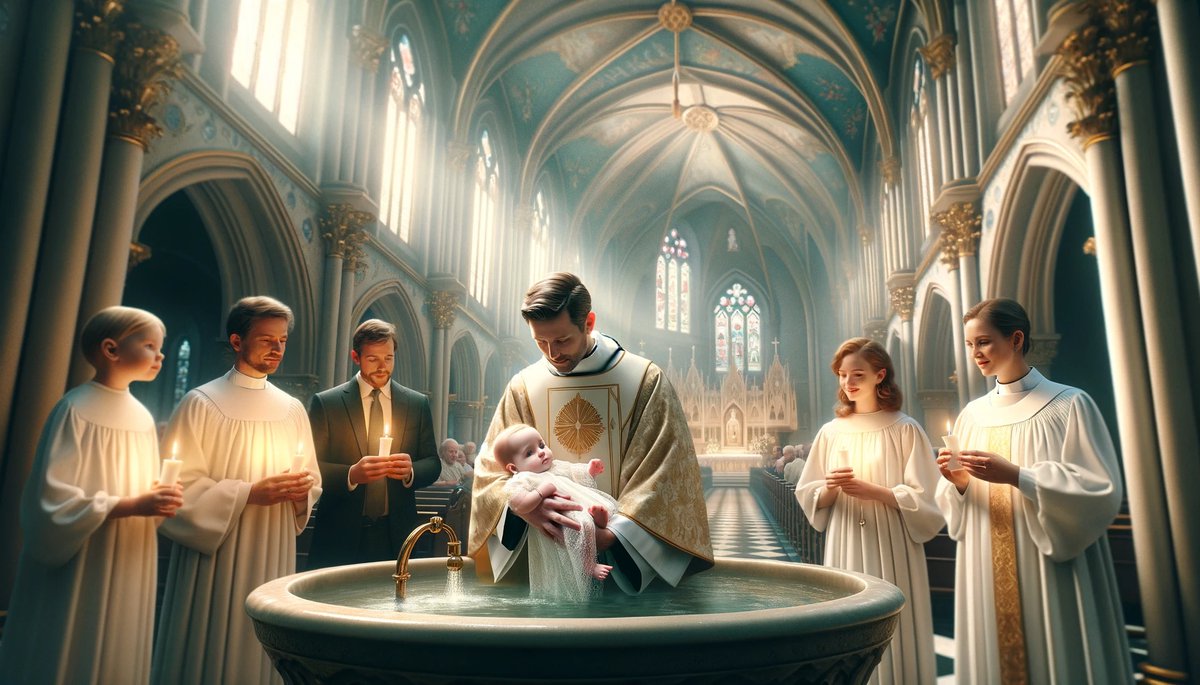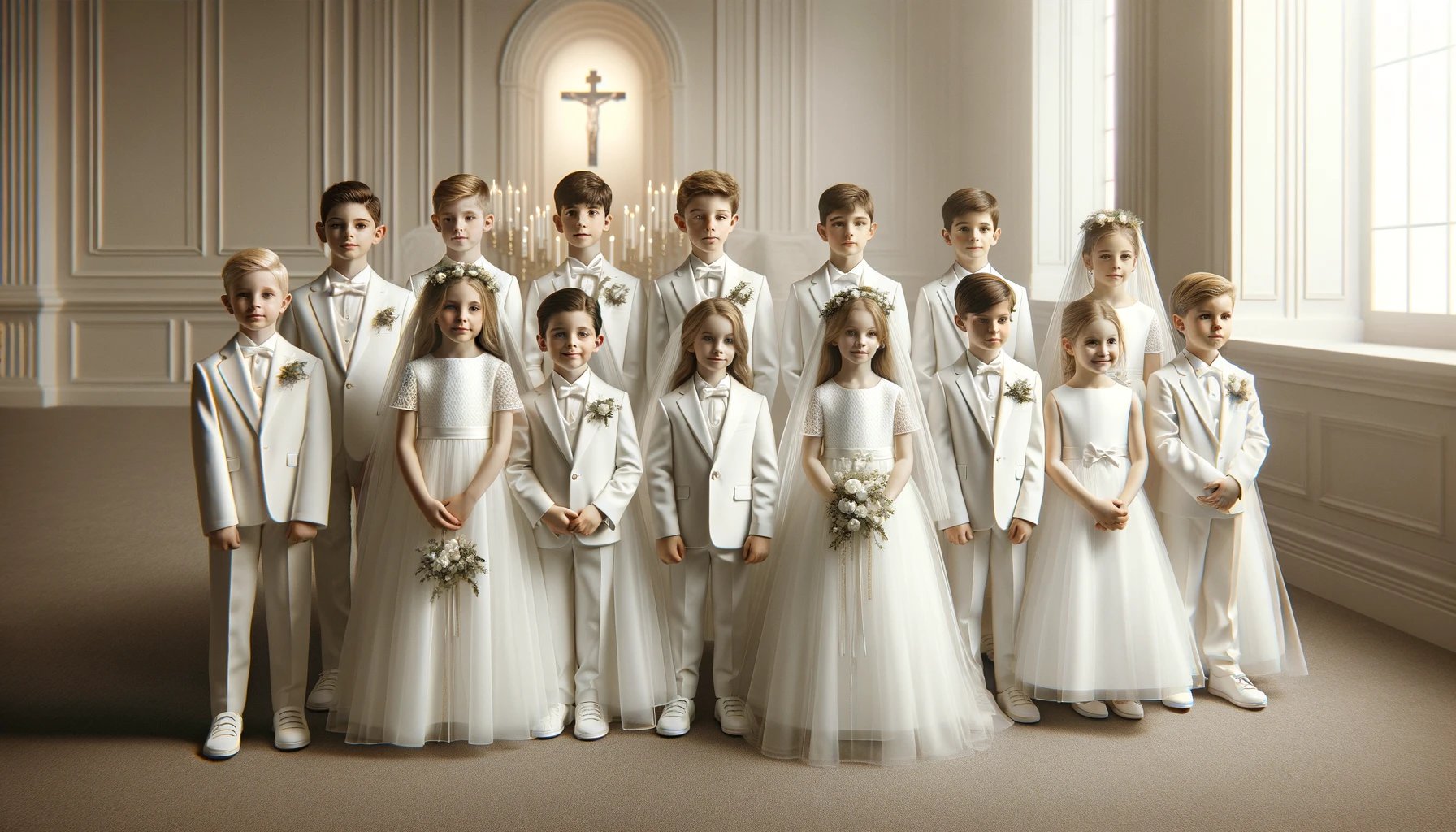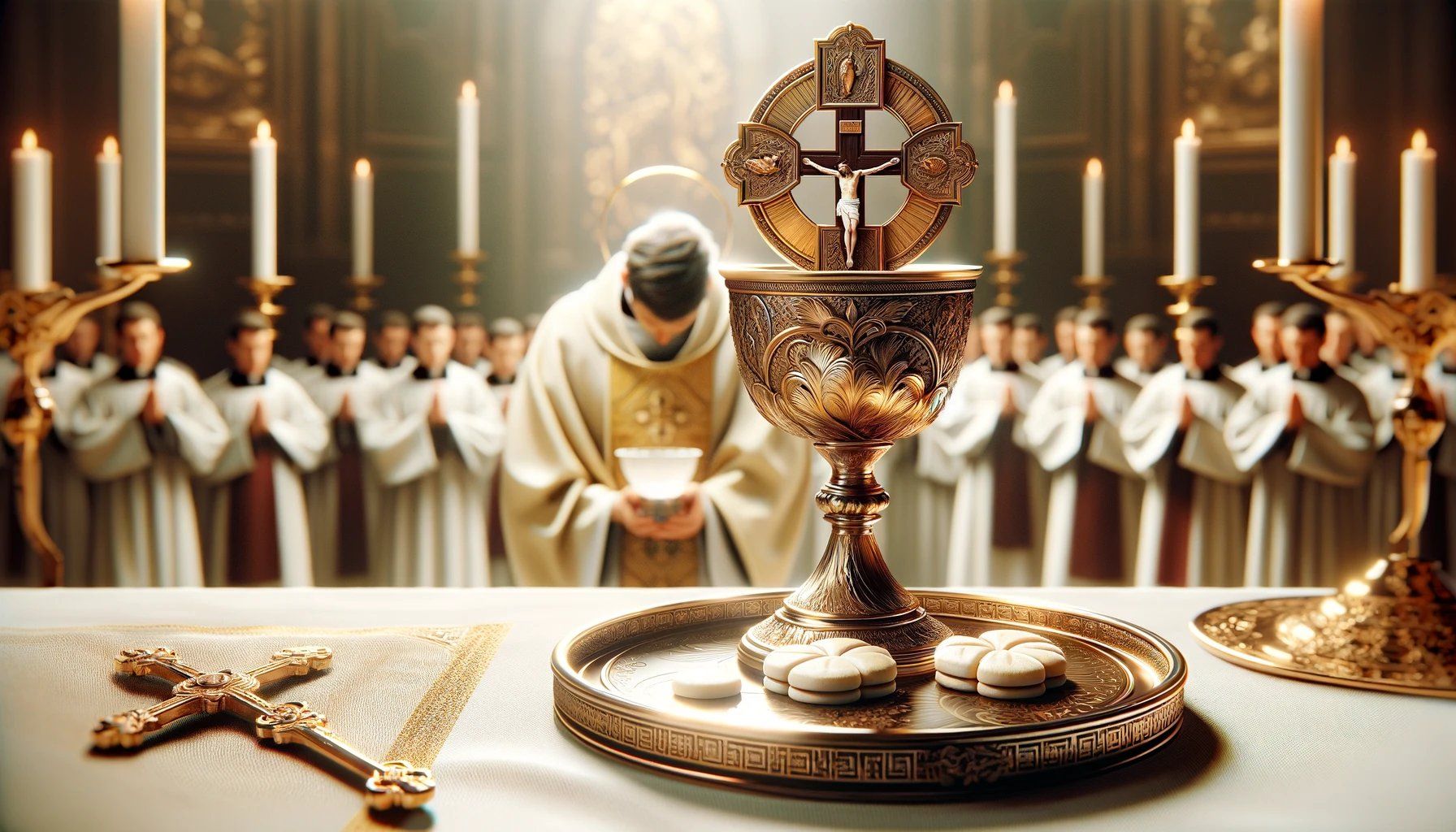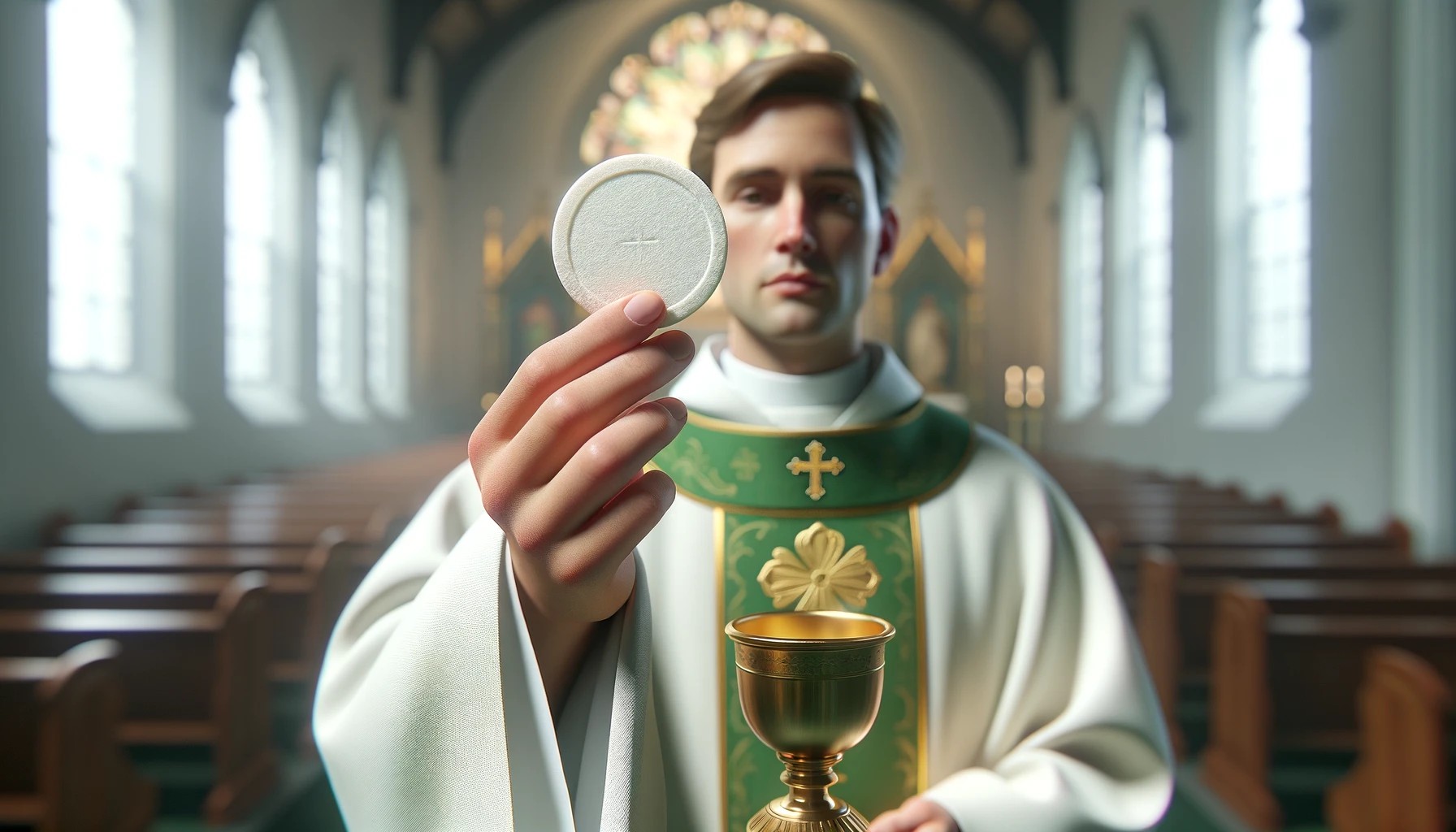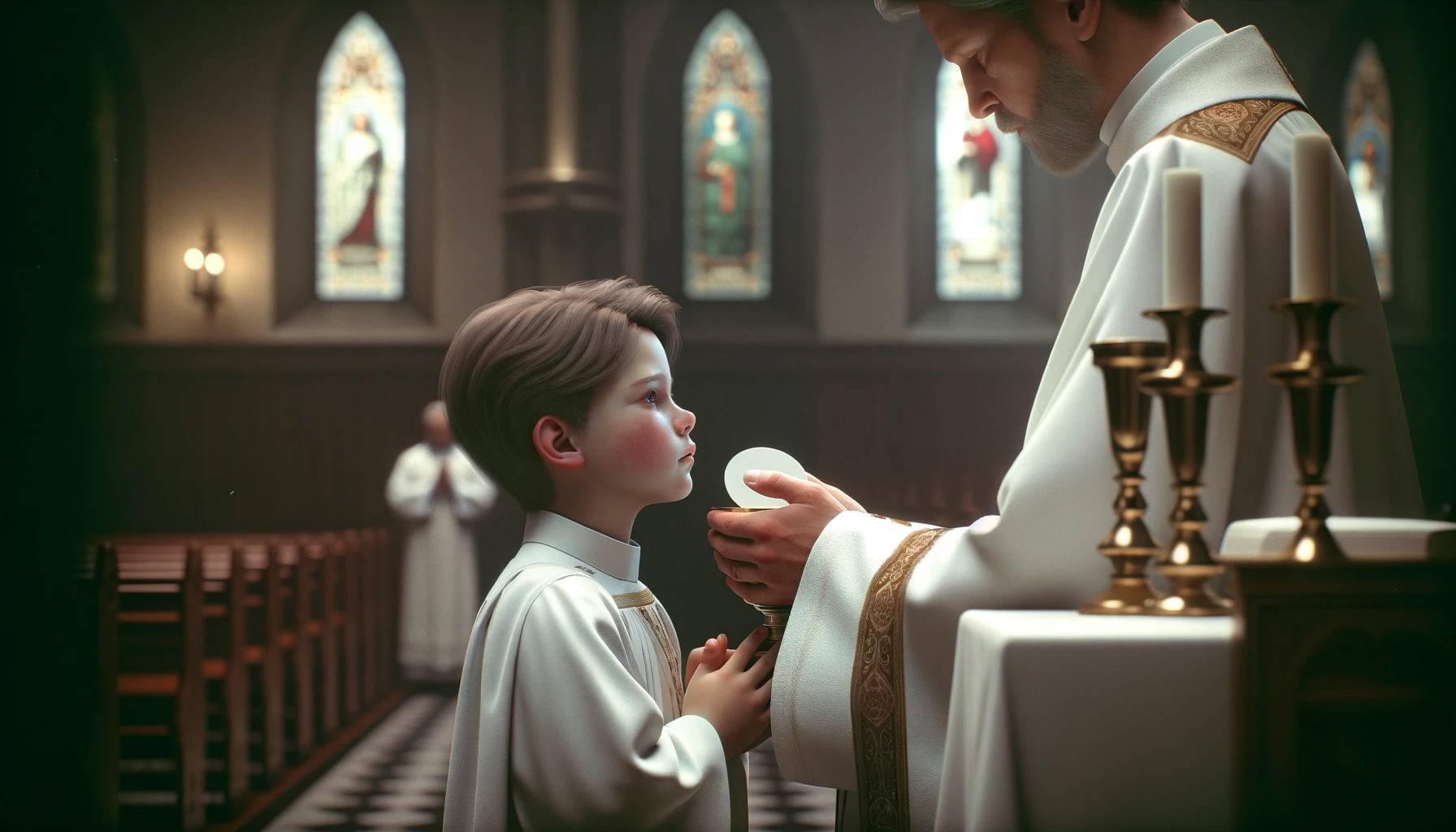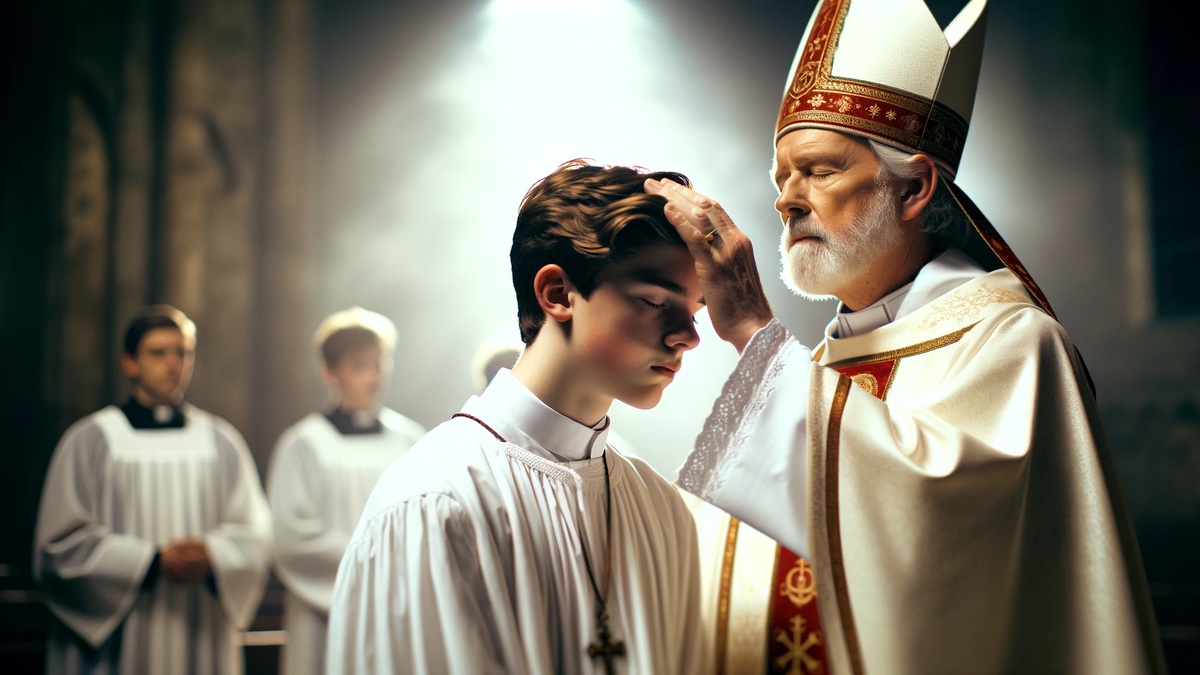Home>Theology and Spirituality>What Is First Communion In The Catholic Church


Theology and Spirituality
What Is First Communion In The Catholic Church
Published: February 24, 2024
Ericka Andersen, an editor at Christian.net, expertly merges digital strategy with content creation, focusing on faith and societal issues. Her communication skills enhance the platform's engaging narratives, fostering meaningful dialogue on belief's impact on society.
Discover the significance and traditions of First Communion in the Catholic Church. Explore its role in theology and spirituality. Gain insights and guidance.
(Many of the links in this article redirect to a specific reviewed product. Your purchase of these products through affiliate links helps to generate commission for Christian.net, at no extra cost. Learn more)
Table of Contents
Introduction
First Communion is a momentous event in the Catholic Church, marking a significant milestone in a young person's spiritual journey. It is a sacred rite of passage that holds deep meaning and symbolism within the Catholic faith. This special occasion, also known as First Holy Communion, is celebrated with great reverence and joy as children partake in the Eucharist for the first time.
The sacrament of First Communion is rooted in the belief that the bread and wine consecrated during the Mass become the body and blood of Jesus Christ. This act of receiving the Eucharist is a central tenet of the Catholic faith, representing the intimate union with Christ and the community of believers. As such, First Communion is a pivotal moment in a child's spiritual development, as they are welcomed into the full participation of the Church's sacramental life.
The significance of First Communion extends beyond the individual, encompassing the family, the parish community, and the broader Church. It is a time of celebration and reflection, as families and friends gather to witness and support the children as they take this important step in their faith journey. The sense of community and shared faith experiences during First Communion further strengthen the bonds of fellowship and unity among believers.
In the following sections, we will delve deeper into the profound significance of First Communion, the preparation involved, the ceremony itself, the act of receiving the Eucharist, as well as the rich traditions and customs associated with this sacred milestone in the Catholic Church. Through this exploration, we will gain a deeper understanding of the spiritual and cultural importance of First Communion and the enduring impact it has on the lives of young Catholics.
The Significance of First Communion
First Communion holds profound significance within the Catholic faith, symbolizing a pivotal moment in a child's spiritual journey. At its core, First Communion represents the reception of the Eucharist, the body and blood of Jesus Christ, during the celebration of the Mass. This act of partaking in the Eucharist is deeply rooted in the teachings of the Catholic Church and carries multifaceted significance for both the individual and the faith community.
Spiritual Milestone
For the young participants, First Communion marks a significant milestone in their spiritual development. It is a tangible expression of their growing understanding of the faith and their readiness to partake in the sacramental life of the Church. Through the reception of the Eucharist, children are invited to deepen their relationship with Christ and experience His presence in a profound and personal way. This sacred encounter with the body and blood of Christ is a source of spiritual nourishment and grace, nurturing their faith and fostering a sense of belonging within the Church.
Initiation into the Faith
First Communion also serves as an initiation into the full participation of the Catholic faith. By receiving the Eucharist for the first time, children are welcomed into the sacramental life of the Church, becoming active participants in the communal worship and spiritual practices of Catholicism. This initiation underscores the significance of the Eucharist as the central act of worship in the Catholic tradition and emphasizes the importance of active engagement in the faith community.
Family and Community Celebration
Beyond its individual significance, First Communion is a joyous occasion that brings families and the parish community together in celebration. It is a time of profound significance for parents, siblings, and extended family members, who witness and support the children as they take this important step in their faith journey. The communal aspect of First Communion fosters a sense of unity and shared faith experiences, strengthening the bonds of fellowship within the Church community.
Symbol of Unity and Belonging
Moreover, First Communion serves as a powerful symbol of unity and belonging within the broader Catholic Church. As children from diverse backgrounds come together to partake in the Eucharist, they affirm their shared identity as members of the universal Church. This sense of unity transcends cultural and geographical boundaries, reinforcing the interconnectedness of the global Catholic community.
In essence, the significance of First Communion encompasses spiritual growth, initiation into the faith, communal celebration, and the affirmation of unity within the Catholic Church. This sacred milestone holds enduring importance for young Catholics and the broader faith community, shaping their understanding of the Eucharist and fostering a deeper connection to their religious heritage.
Preparation for First Communion
The preparation for First Communion is a significant and transformative journey that equips children with the knowledge, understanding, and spiritual readiness to receive the Eucharist for the first time. This period of preparation is designed to nurture the young participants' faith, deepen their understanding of the sacrament, and instill a sense of reverence for the Eucharist. The process typically involves a combination of religious education, spiritual formation, and communal engagement, guided by the collaborative efforts of families, catechists, and the parish community.
Religious Education
Central to the preparation for First Communion is religious education, which provides children with a comprehensive understanding of the Eucharist, its significance, and the rituals associated with receiving the sacrament. Through catechetical instruction, young participants learn about the Last Supper, the transformation of bread and wine into the body and blood of Christ, and the theological underpinnings of the Eucharist. They also delve into the meaning of Communion, the importance of reverence, and the practical aspects of participating in the Mass.
Spiritual Formation
In addition to academic instruction, spiritual formation plays a vital role in preparing children for First Communion. This aspect of preparation focuses on nurturing the participants' spiritual growth, fostering a personal connection to their faith, and cultivating a sense of reverence for the Eucharist. Through prayer, reflection, and age-appropriate spiritual exercises, children are encouraged to deepen their relationship with Christ and develop a heartfelt appreciation for the sacrament they are about to receive.
Sacramental Readiness
The period of preparation also involves discerning the participants' sacramental readiness to receive First Communion. This entails assessing their understanding of the Eucharist, their willingness to actively participate in the Mass, and their sincere desire to receive the body and blood of Christ. Catechists and families work together to support the children in embracing the spiritual significance of the sacrament and preparing their hearts to receive the Eucharist with reverence and devotion.
Family and Community Engagement
Furthermore, the preparation for First Communion extends beyond the classroom, encompassing the active involvement of families and the broader parish community. Parents and guardians play a pivotal role in supporting their children's preparation, engaging in discussions about faith, attending parent-child workshops, and nurturing a home environment that fosters spiritual growth. The parish community also plays a vital role, offering support, guidance, and communal prayer to accompany the children on their journey toward First Communion.
In essence, the preparation for First Communion is a holistic and collaborative process that integrates religious education, spiritual formation, sacramental readiness, and communal engagement. This comprehensive approach equips children with the knowledge, spiritual foundation, and supportive community they need to embark on this sacred milestone in their faith journey.
The First Communion Ceremony
The First Communion ceremony is a deeply significant and reverent occasion within the Catholic Church, marking the culmination of a child's preparation to receive the Eucharist for the first time. This sacred event is typically held within the context of a Mass, where the young participants, dressed in their finest attire, gather with their families and the faith community to partake in this momentous rite of passage.
The ceremony begins with a sense of anticipation and solemnity as the children, accompanied by their parents and sponsors, process into the church. This procession symbolizes their readiness to embrace the sacrament of the Eucharist and is a poignant moment that underscores the communal support and encouragement surrounding the young participants.
As the Mass unfolds, the First Communicants actively engage in the liturgy, participating in prayers, hymns, and readings that reflect the significance of the Eucharist. The homily often centers on the profound meaning of the sacrament, emphasizing the transformative power of receiving the body and blood of Christ and the responsibilities that come with this sacred act.
The pinnacle of the ceremony is reached during the Liturgy of the Eucharist, as the young participants approach the altar to receive the consecrated host from the hands of the priest. This moment is imbued with deep reverence and awe, as the children, with hearts full of faith and humility, partake in the Eucharist for the first time. The act of receiving the body of Christ is a poignant and intimate encounter, symbolizing the union of the communicants with Jesus and the spiritual nourishment that the Eucharist provides.
Following the reception of the Eucharist, the First Communicants and the congregation engage in a period of silent prayer and reflection, allowing the significance of the moment to resonate deeply within their hearts. This period of contemplation provides an opportunity for the young participants to express their gratitude to God for the gift of the Eucharist and to seek His guidance in their ongoing spiritual journey.
The First Communion ceremony concludes with a sense of joy and celebration, as the newly initiated communicants, now united in a special bond with Christ and the Church, receive the blessings of the priest and are warmly embraced by their families and the faith community. This joyous culmination of the ceremony reflects the profound significance of the Eucharist in the lives of the young participants and the communal support that surrounds them as they continue to grow in their faith.
In essence, the First Communion ceremony is a sacred and transformative experience that embodies the spiritual significance of the Eucharist and the communal celebration of a child's initiation into the full participation of the Catholic faith.
Receiving the Eucharist
Receiving the Eucharist is the central focus of the First Communion ceremony, representing the pinnacle of the young participants' spiritual journey within the Catholic Church. As the culmination of their preparation, the act of receiving the Eucharist holds profound significance and symbolism, embodying the intimate union between the communicants and Jesus Christ.
As the moment approaches, the First Communicants, guided by a sense of reverence and awe, approach the altar where the consecrated host, the body of Christ, is presented to them by the priest. This sacred encounter is marked by a palpable sense of anticipation and humility, as the children, with hearts full of faith, extend their hands to receive the Eucharist for the first time. The act of receiving the consecrated host is a deeply personal and transformative experience, as the communicants partake in the body of Christ, symbolizing their spiritual nourishment and unity with Jesus.
Upon receiving the Eucharist, the communicants return to their seats, where they engage in a period of silent prayer and reflection. This moment of contemplation allows the significance of the Eucharist to resonate deeply within their hearts, fostering a sense of gratitude, reverence, and spiritual communion with Christ. It is a time for the young participants to express their heartfelt thanks for the gift of the Eucharist and to seek God's guidance as they continue their journey of faith.
The act of receiving the Eucharist during First Communion is a poignant and sacred moment that underscores the transformative power of the Eucharist in the lives of the young participants. It represents their initiation into the sacramental life of the Church and serves as a tangible expression of their growing relationship with Christ. Through this act, the communicants are nourished spiritually, drawing strength and grace from the body of Christ, and are invited to embrace their role as active members of the faith community.
In essence, the act of receiving the Eucharist during First Communion encapsulates the profound significance of the sacrament, fostering a deep sense of spiritual communion, gratitude, and unity with Christ among the young participants. It is a moment that resonates with reverence and joy, marking the beginning of their continued journey of faith within the Catholic Church.
Traditions and Customs
The celebration of First Communion is steeped in rich traditions and customs that reflect the cultural and spiritual heritage of the Catholic Church. These time-honored practices add depth and significance to the sacred milestone of receiving the Eucharist for the first time, enriching the experience for the young participants and their families.
Attire and Symbols
One of the enduring customs associated with First Communion is the attire worn by the communicants. It is customary for girls to wear white dresses, symbolizing purity and the radiant joy of the occasion, while boys often don suits or formal attire, signifying reverence and solemnity. Additionally, the wearing of veils by girls and armbands or ties by boys serves as a visual representation of their participation in this sacred rite of passage.
Family Involvement
Family involvement is a cornerstone of First Communion traditions. Parents and guardians play an integral role in preparing their children for this sacramental milestone, offering guidance, support, and spiritual nurturing throughout the preparation process. Moreover, the familial bond is celebrated and strengthened through the active participation of family members in the First Communion ceremony and related festivities, fostering a sense of unity and shared faith experiences.
Communal Celebrations
First Communion is often commemorated with communal celebrations that extend beyond the church ceremony. Families and parish communities come together to organize gatherings, receptions, and festive meals, where the joyous occasion is celebrated with music, food, and fellowship. These communal celebrations serve as a testament to the interconnectedness of the faith community and the shared significance of the First Communion experience.
Gift-Giving Traditions
The tradition of gift-giving is a cherished custom associated with First Communion. Family members, friends, and the faith community present the young communicants with religious gifts, such as rosaries, prayer books, crosses, and religious medals, symbolizing their continued spiritual journey and the importance of faith in their lives. These gifts serve as meaningful reminders of the significance of the sacrament and the enduring support of the community.
Cultural Variations
While certain traditions are widely observed, there are cultural variations in the customs surrounding First Communion. Different regions and ethnic communities may have unique customs, attire, and rituals that reflect their cultural heritage and traditions. These diverse expressions of faith add vibrancy and depth to the celebration, highlighting the universal significance of First Communion within the diverse tapestry of the Catholic Church.
In essence, the traditions and customs associated with First Communion encapsulate the cultural, familial, and spiritual dimensions of this sacred milestone. These time-honored practices enrich the experience of receiving the Eucharist for the first time, fostering a sense of unity, reverence, and joy within the faith community and leaving a lasting impression on the young participants as they continue their journey of faith within the Catholic Church.
Conclusion
In conclusion, First Communion holds profound significance within the Catholic Church, representing a transformative and sacred milestone in the spiritual journey of young participants. The act of receiving the Eucharist for the first time symbolizes a deepening of their relationship with Christ and their initiation into the sacramental life of the Church. This momentous occasion is marked by spiritual preparation, communal celebration, and the rich traditions and customs that reflect the cultural and spiritual heritage of the Catholic faith.
The significance of First Communion extends beyond the individual participants, encompassing their families, the parish community, and the broader Church. It serves as a testament to the unity and shared faith experiences that bind believers together, fostering a sense of communal support and spiritual fellowship. The preparation for First Communion, involving religious education, spiritual formation, and communal engagement, equips children with the knowledge, understanding, and spiritual readiness to embrace the Eucharist with reverence and devotion.
The First Communion ceremony itself is a deeply reverent and joyous occasion, where the young participants, adorned in symbolic attire, partake in the Eucharist within the context of the Mass. This sacred event is accompanied by communal celebrations, family involvement, and the exchange of meaningful religious gifts, further emphasizing the communal support and shared significance of the First Communion experience.
Moreover, the act of receiving the Eucharist during First Communion represents a poignant and transformative moment, fostering a deep sense of spiritual communion, gratitude, and unity with Christ among the young participants. It symbolizes their ongoing journey of faith within the Catholic Church and the nourishment they receive from the body and blood of Christ.
In essence, First Communion embodies the spiritual and communal dimensions of the Catholic faith, shaping the faith journey of young participants and leaving an indelible impression on their lives. It is a celebration of unity, reverence, and joy, reflecting the enduring significance of the Eucharist within the diverse tapestry of the Catholic Church. As the young communicants continue to grow in their faith, the experience of First Communion serves as a foundational cornerstone, nurturing their spiritual development and fostering a deep and abiding connection to their religious heritage.
